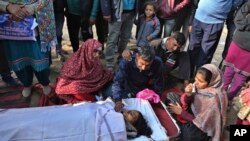Tensions have soared along the volatile frontier between India and Pakistan in the disputed Himalayan region of Kashmir, as rival troops shelled villages and border posts for a third day Friday.
Three civilians and a soldier were killed on both sides in the latest clash, officials in the two countries said, as each blamed the other for initiating the violence.
Indian officials said two civilians and a paramilitary soldier died and at least 10 civilians and two soldiers were injured in Indian-controlled Kashmir. According to Pakistani officials, Indian fire on Friday killed a civilian and wounded nine others in Sialkot in Pakistan's eastern Punjab province.
An Indian paramilitary officer said soldiers were responding to Pakistani firing and shelling on dozens of border posts and called it an “unprovoked” violation of a 2003 cease-fire accord.
Angered over the rising violence, Pakistan's Foreign Ministry summoned Indian Deputy High Commissioner J.P. Singh and condemned what it called “unprovoked cease-fire violations” by India.
Each country has also accused the other of initiating past border skirmishes and causing civilian and military casualties.
The Indian officer, speaking on condition of anonymity in keeping with official policy, said Friday's shelling came after relative calm overnight in Jammu following two days of fighting that left at least three civilians and a soldier dead and several others wounded on both sides.
The border guard official said by Friday evening fighting had stopped in most places but still continued at about half a dozen outposts.
Indian police officer S.D. Singh said shells have landed in dozens of villages since early Friday. He said authorities deployed bulletproof vehicles to evacuate people who were injured and sick. Bullets and shrapnel scarred homes and walls amid the intense firing and shelling.
Dozens of schools in villages along the frontier have been closed and authorities advised residents to stay indoors as shells and bullets rained down. Some damage to houses was also reported on the Indian side.
Pakistan urged India to respect the cease-fire, investigate the latest incidents and maintain peace on the frontier. It also asked India to allow the U.N. Military Observer Group in India and Pakistan to play its mandated role in accordance with Security Council resolutions.
“This unprecedented escalation in cease-fire violations by India is continuing” since 2017 despite calls for restraint from Islamabad, Pakistan's statement said.
India's Foreign Ministry condemned what it called “continued and unprecedented cease-fire violation by Pakistan, which has caused loss of lives and properties.”
“Pakistan violates the cease-fire as a cover to infiltrate terrorists across the border into India. We of course retaliate in such cases,” said Raveesh Kumar, India's foreign ministry spokesman. “We'll also take up the matter at appropriate level with the Pakistani side.”
India and Pakistan have a long history of bitter relations over Kashmir, a Himalayan territory claimed by both in its entirety. They have fought two of their three wars over the region since they gained independence from British colonial rule in 1947.
The latest fighting is taking place along a somewhat-defined frontier where each country has a separate paramilitary border force guarding the lower-altitude 200-kilometer (125-mile) boundary separating Indian-controlled Kashmir and the Pakistani province of Punjab.
The contentious frontier also includes a 740-kilometer (460-mile) rugged and mountainous stretch called the Line of Control that is guarded by the armies of India and Pakistan.
The exchange of fire comes days after Islamabad accused Indian forces of killing four Pakistani soldiers along the Line of Control in Kashmir, where rebel groups demand that Kashmir be united either under Pakistani rule or as an independent country.
India accuses Pakistan of arming and training the rebels, which Pakistan denies.
Nearly 70,000 people have been killed in the uprising and the ensuing Indian military crackdown since 1989.




